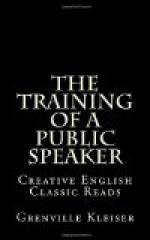When the orator does sound a retreat, no less ample fruits of study will attend on him. He either will write the history of his time for the instruction of posterity, or he will explain the law to those who came to ask his advice, or he will write a treatise on eloquence, or that worthy mouth of his will employ itself in inculcating the finest moral precepts. As was customary with the ancients, well-disposed youth will frequent his house, consulting him as an oracle on the true manner of speaking. As the parent of eloquence will he form them, and as an old experienced pilot will he give them an account of shores, and harbors, and what are the presages of storms, and what may be required for working the ship in contrary or favorable winds. To all this will he be induced not only by a duty of humanity common to mankind, but also by a certain pleasure in it; for no one would be glad to see an art going into decay, in which he himself excelled, and what is more laudable than to teach others that in which one is perfectly skilled?
For all I know, the happiest time in an orator’s life is when he has retired from the world to devote himself to rest; and, remote from envy, and remote from strife, he looks back on his reputation, as from a harbor of safety; and while still living has a sense of that veneration which commonly awaits only the dead; thus anticipating the pleasure of the noble impression posterity will conceive of him. I am conscious that to the extent of my poor ability, whatever I knew before, and whatever I could collect for the service of this work, I have candidly and ingenuously made a communication of, for the instruction of those who might be willing to reap any advantage from it: and it is enough for an honest man to have taught what he knows.
To be good men, which is the first and most important thing, consists chiefly in the will, and whoever has a sincere desire to be a man of integrity, will easily learn the arts that teach virtue; and these arts are not involved in so many perplexities, neither are they of such great number, as not to be learned by a few years’ application. The ordering of an upright and happy life is attainable by an easy and compendious method, when inclination is not lacking. Nature begot us with the best dispositions, and it is so easy to the well-inclined to learn that which is good, that we can not help being surprized, on making a due estimate of things, how there can be so many bad persons in the world. For, as water is naturally a proper element for fish, dry land for quadrupeds, and air for birds, so indeed it ought to be more easy to live according to the prescript of nature than to infringe her laws.




